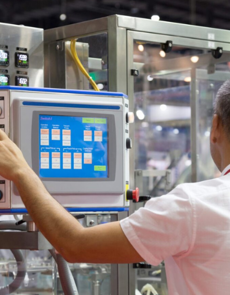Smart Manufacturing: What Is It and Why Is It Important Now?
Rising costs, supply chain issues and skills shortages. Growing competition and increasing customer expectations. The landscape continues to be challenging for manufacturers and standing still isn't an option. However, traditional manufacturing approaches are struggling to keep pace, adding inefficiencies, wasted resources, and missed opportunities to the list.
The solution? Smart manufacturing—a digital approach leveraging data and advanced technologies. This holistic approach empowers manufacturing businesses to anticipate challenges, respond swiftly to changes, and unlock new opportunities for growth and innovation.
In this article, we'll explore how smart manufacturing solutions can address modern manufacturing issues to unlock greater efficiencies and profit-boosting opportunities. Most importantly, we'll discover how embracing smart manufacturing solutions helps your business be future-ready.
What Is Smart Manufacturing?
Smart manufacturing integrates data-driven technologies throughout the production cycle to optimise efficiency. Technologies like Industrial Internet of Things (IIoT) and Artificial Intelligence (AI) can be incorporated into supply chains, production processes, and even business systems.
Implemented in isolation, these technologies help eliminate points of weakness, increase efficiency, and give you visibility across production. Combined, they connect the entire manufacturing ecosystem, driving transformative change.
At the heart of smart manufacturing is access to data, giving you both the big picture and the finer details of what's happening right now—and what might happen down the line. Whether it's spotting machine performance issues, predicting maintenance needs, avoiding supply chain delays, or improving energy use, you'll always be in the know.
This means you can make smarter, faster decisions to tackle problems before they escalate and seize opportunities as they appear. With AI-powered automation in the mix, your operations can adjust in the moment, keeping everything running smoothly and efficiently.
Widely acknowledged as one of the foundations of Industry 4.0, smart manufacturing is quickly becoming the cornerstone for operational excellence.
Smart manufacturing solutions
Smart manufacturing offers a game-changing shift in your operations that goes beyond the production floor to impact every part of the business. It's about transforming the way your business functions as a whole, creating a seamless connection between people, processes, and technology.
- Predictive analysis and automation
Smart manufacturing gives you advanced tools to truly optimise the production process, putting you in more control than ever before. With a clearer view of every aspect of production, from supply chains to environmental conditions, your business becomes more proactive and resilient.
- Automated quality management systems
AI-driven systems ensure products meet safety, performance, and regulatory standards. AI-powered inspections pick up defects often missed by the human eye, increasing consistency, reducing waste and giving you greater peace of mind.
- Self-optimising machinery
Through continuous monitoring and live data, advanced machinery automatically adjusts to maintain precise product specifications. This ensures accuracy and consistency, even for the most intricate parts.
- Autonomous production processes
Physically demanding or repetitive tasks are streamlined, allowing faster production at scale without compromising worker safety.
- AI-driven planning, 3D printing and digital design tools
These flexible systems allow manufacturers to be responsive to market trends. Easily adapt workflows, prototype new products at speed and test small-batch production without sacrificing efficiency.
- Supply chain integration
Digital connection across departments and supply chain integration enables more accurate demand and supply forecasting. That means improved inventory management and production schedule adjustments to meet customer expectations.
Smart manufacturing across industries
Smart manufacturing technology is setting new standards across every industry. While there's still a way to go before every sector embraces its full potential, some are already leveraging the benefits.
- Automotive: Predictive maintenance systems are helping keep precision tooling running smoothly and minimising downtime.
- Food and beverage: IoT sensors allow the real-time monitoring of production line conditions for consistent quality and safety compliance.
- Electronics: Automated quality inspection is detecting component defects during production, ensuring substandard products don't reach the market.
- Aerospace: AI-powered systems are analysing production data to improve efficiency and reduce material waste, ensuring high performance for complex components.
- Consumer goods: Automated packaging lines are allowing dynamic adjustment to changing demand or product designs.
Smart manufacturing in action
Pharmaceutical company AstraZeneca has a vision for becoming the world's first end-to-end optimised pharmaceutical manufacturing supply chain. From automation and IoT to AI, big data analytics and robotics, they're already realising higher safety, quality and efficiency.
Here's how they're leveraging the power of digital throughout their end-to-end supply chain:
- In-silico experimentation, digital twin modelling and simulation are accelerating drug development time and reducing waste.
- Advanced and predictive business analytics are driving greater insight, predicting outcomes and optimising processes.
- Factory dashboards is empowering teams to make patient-centric decisions based on accurate information faster than ever before.
- Digital work instructions and workflow is improving 'right first-time', driving efficiency and improving productivity across the business.
- AI is helping simulate factory flow, optimising operations and in turn, reducing lead times and increasing productivity.
- Digitally connecting the entire supply chain is giving greater visibility, enabling better forecasting and planning to distribute medicines with greater speed and agility, and reduced inventory
What is the difference between lean manufacturing and smart manufacturing?
Lean manufacturing focuses on doing more with fewer resources to deliver maximum value to customers.
Smart manufacturing delivers greater customer value through data-driven insights and flexible, automated systems.
Operational excellence spans both lean manufacturing and smart manufacturing. However, their focus and methodology are fundamentally different. With roots in traditional principles, lean manufacturing emphasises human-driven process improvements. In contrast, smart manufacturing is future-focused and driven by technology.
In an increasingly digital world, it's easy to see why embracing technology should be on every manufacturer's radar. However, the lean manufacturing framework has proved itself time and again as a sound strategy: streamlining workflows, reducing non-value-adding activities, and optimising resources. But it can be limiting.
Out-of-date data results in delayed responses to disruptions and missed chances to optimise operations. Disjointed systems can cause flow inefficiencies. While a human-driven continuous improvement approach hinders adaptability and scalability.
The case for integrating smart manufacturing solutions
Fortunately, lean manufacturing and smart manufacturing aren't mutually exclusive. They are often adopted as complementary approaches to optimising production and boosting the bottom line.
Introduce smart manufacturing into a lean manufacturing framework and you have a lean, flexible, and responsive manufacturing environment. Utilising advances such as IIoT, AI and robotics, smart manufacturing augments lean principles through end-to-end connectivity and game-changing insight across operations.
Where lean manufacturing once revolutionised the manufacturing industry, smart manufacturing is widely considered a key component of Industry 4.0. Together, they have the potential to transform operations for manufacturers looking to be fit for the future.
At a glance: Lean manufacturing vs. smart manufacturing
|
Aspect |
Lean manufacturing |
Smart manufacturing |
|
Core focus |
Waste reduction, process optimisation |
Data-driven decisions, real-time optimisation across the manufacturing ecosystem |
|
Technologies |
Process tools such as Kanban and JIS |
IoT, AI, ML, robotics, big data analytics |
|
Efficiency |
Streamlining processes, human-driven continuous improvement |
Predictive analytics and automation |
|
Flexibility and agility |
Focus on standardisation, less flexible |
Fast adaptation, highly flexible |
|
Waste reduction |
Eliminates waste by streamlining processes |
Reduces waste through data analysis and automation |
|
Customisation |
Less suitable for customisation |
Highly suitable for mass customisation |
|
Sustainability |
Achieved through waste reduction |
Delivered via smart technology and resource optimisation |
The Benefits of Smart Manufacturing Solutions
- 30-50% reduction in machine downtime
- 10-30% increase in throughput
- 15-30% improvement in labour productivity
- 85% more accurate forecasting
Source: McKinsey & Company
An increasing number of manufacturers are integrating smart manufacturing solutions into their processes. With smart manufacturing synonymous with Industry 4.0, it's quickly becoming a necessity for manufacturers aiming to stay competitive. Let's consider five indisputable ways smart manufacturing can deliver big business benefits.
Reduce production errors
Sensors and IoT devices embedded within equipment and systems monitor environmental conditions and internal parameters in real time. Deviations from standard operating conditions are picked up while processing errors are prevented from progressing down the production line.
Increase product quality
Tracking materials and components through supply chain integrations ensures accurate sourcing, verifies authenticity and ensures consistent quality. On the production line, automated product control detects and rejects defective items, making sure substandard products never reach customers.
Build a sustainable process
Monitoring energy and material usage data provides the data needed to reduce your operations' environmental impact. Automation transforms those insights into action, enabling you to use fewer materials, consume less energy, and reduce waste by minimising reworks and recalls. Connect supply chains, and you can improve transport efficiency and operate more sustainably away from the production floor too.
Operate more securely
Combined technologies such as AI, blockchain, automation, IoT and predictive analysis mitigate physical and digital security risks. Continuous monitoring detects and responds to threats to protect assets, data and personnel to make your manufacturing environment more secure.
Reduce costs
Prevention algorithms, predictive maintenance, and big data analytics combine to drive business-wide efficiency. Reduced downtime, fewer production defects, more efficient workflows, and optimised resource allocation and planning contribute to lower operational costs and higher revenue.
Smart Manufacturing Technology
Real-time data, IoT integration, automation, AI, digital twins, cloud computing, cyber-physical systems, and supply chain integration form the foundation of a modern, efficient production ecosystem. Together, they optimise operations, enhance decision-making, improve product quality, and drive cost savings across the entire manufacturing process. Here we take a closer look at the key smart manufacturing technologies.
Industrial Internet of Things (IIoT)
Smart sensors and intelligent devices designed to collect, exchange, and centralise live performance data and track assets.
IIoT creates the infrastructure for gathering real-time status and activity data on machinery and assets and receives the data that automates tasks and processes. Live data from these interconnected devices is centralised and analysed using AI and ML to enhance operational efficiency, safety, and transparency across the manufacturing ecosystem.
Artificial intelligence (AI)
A range of technologies that mimic human thinking and perform tasks traditionally requiring human intelligence.
System-wide visibility gives access to previously hidden data, unlocking a deeper understanding of processes, products, and workforce performance. Add AI and manufacturing data from disparate systems is turned into actionable insights, powering smarter decisions. While AI-powered automation transforms those insights into actionable improvements and makes light work of routine tasks like inventory management and productivity tracking.
Data Lakehouses
Data architecture to store and process large volumes of both raw, unstructured data (like images and audio) and structured data (such as transactional records) in a single, unified platform.
The data lakehouse acts as a central hub for serving manufacturing analytics tools with data. Its uniqueness lies in its ability to store and organise diverse data from multiple sources, such as IoT devices, production logs, and environmental sensors. Vast amounts of raw data all in one place allow more accurate AI-driven analysis and insight across operations.
Where to Start with Smart Manufacturing?
In the age of Industry 4.0, smart manufacturing can't be ignored. Yet it's not about replacing what already works but integrating advanced technologies like AI, IIoT and automation with traditional systems to work smarter. With improved process efficiencies, productivity gains, and an empowered workforce, manufacturers are more agile, resilient, and competitive in an increasingly digital world.
Wondering where to start or ready to take the next step? With Access manufacturing software such as Access FactoryMaster and Access Orchestrate, you can streamline your production process and simplify operations to boost efficiency almost effortlessly.


